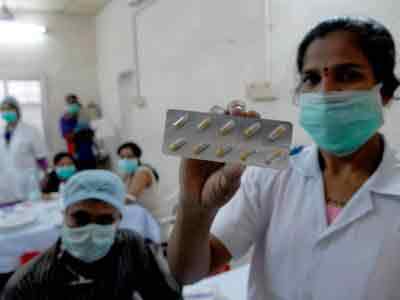Mumbai: The H1N1 influenza virus which entered the list of infectious diseases with a global pandemic in 2009, has overtaken dengue and malaria to become the biggest killer among seasonal ailments in Maharashtra.
Since its appearance, the viral infection has claimed nearly 2,500 lives in the state, about five times the fatalities caused by dengue and three times that of malaria in the same period. The viral infection is now next only to tuberculosis and AIDS in the state’s list of top contagious killer diseases. TB and AIDS together are responsible for more than 10,000 deaths in the state annually.
While annual death toll of dengue and malaria have reduced to double digits over the years, H1N1, initially called swine flu, has managed to spring a surprise almost every alternate year, killing hundreds. In the first half of 2017 alone, 247 people died of the airborne disease in Maharashtra, including 10 in Mumbai. Three deaths occurred in the last week, two of the victims being a pregnant woman and another a TB patient.
Dr A C Dhariwal, director of National Centre for Disease Control (NCDC), said HINI “has indeed changed the way we used to tackle viral fever in the country. Apart from Maharashtra, Gujarat and Kerala are also badly affected”.
In January-June this year, H1N1 claimed more lives in Maharashtra than malaria which has caused one fatality and dengue two.
The resurgence comes after a lull in 2016 when far fewer deaths (26) were reported. In 2015, the state had witnessed its worst outbreak with 905 deaths.
Experts say its mode of transmission—through infected droplets released into the air—makes control or prevention almost as challenging as in the case of tuberculosis. “In dengue and malaria, we can attack the vector and control the disease. But your combat tools are limited when the fight is against an airborne disease that provides a limited window to treat,” said Dr Satish Pawar, head of Directorate of Health Services (DHS), Maharashtra.
Pawar says tuberculosis, except the cerebral type, takes at least a few years to take a life-threatening form, whereas H1N1’s progression is exceptionally rapid. “Doctors often tend to wait for test reports, which is costing us lives,” he said, explaining why a viral disease is causing such a high number of casualties. In addition, he says, mostly people with underlying health problems are succumbing to the disease.
Infectious disease expert Dr Om Srivastava said clinical challenges of treating H1N1 are unique. “The antiviral oseltamivir works for most cases, but some patients who deteriorate despite treatment,” he said, adding dengue and malaria no longer pose the threat they did even a few years ago. “Dengue has less than 1% mortality and less than 3% hospitalisation rate if all basics of treatment are followed. In H1N1, however, mortality could go up to 20% if treatment has not been started in the first five days,” he said.
Epidemiologist Dr Pradeep Awate though feels much of the hype around H1N1 is because of enhanced surveillance. “We keep a count of every single case and death. In my personal opinion, TB is a much bigger public health problem, and if drug-resistant cases keep growing we may have to go back to the TB asylum era,” he said. “But of course it’s true that influenza surveillance began only after H1N1,” he added.
A senior physician from KEM Hospital said, “All these decades we lost countless lives to seasonal influenza, but didn’t know the magnitude. These numbers should force the government to design vaccination plans and build awareness campaigns around coughing etiquette or hand-washing,” the doctor said, adding the government needs to allocate more funds for influenza control.
Source: THE TIMES OF INDIA




